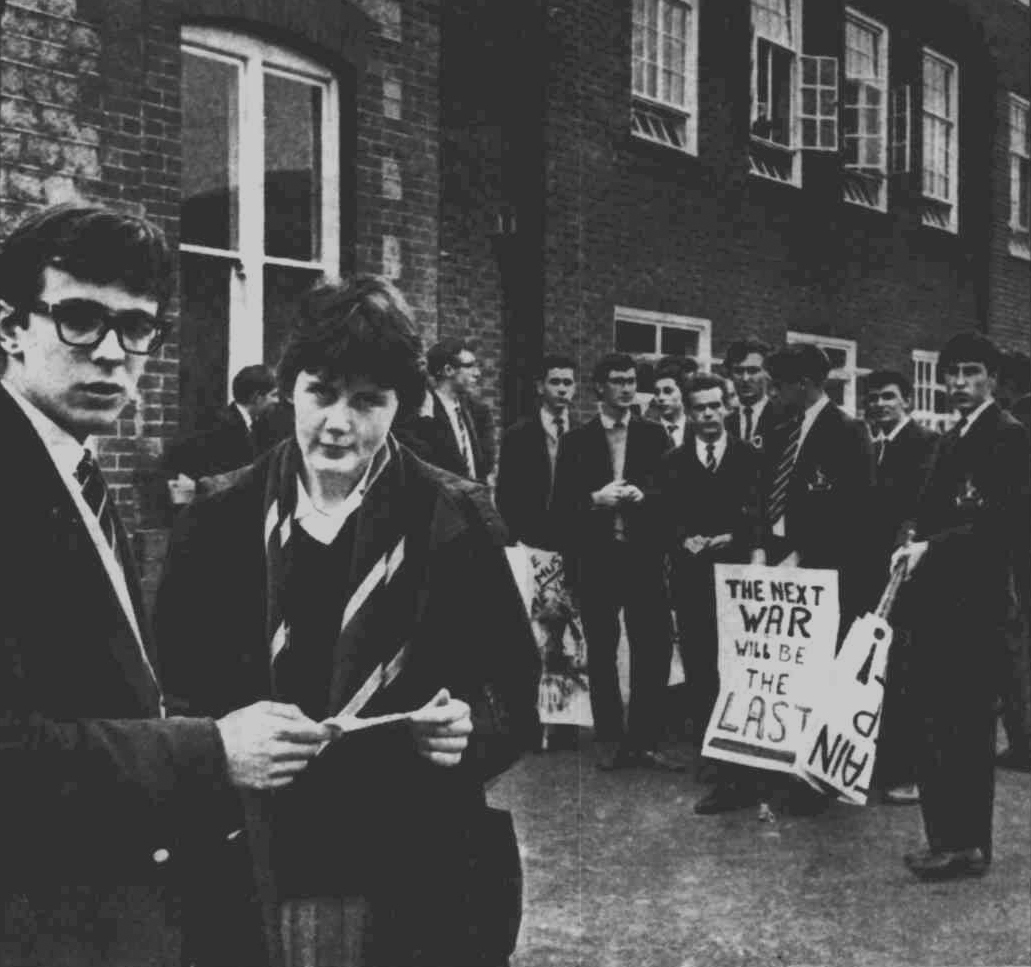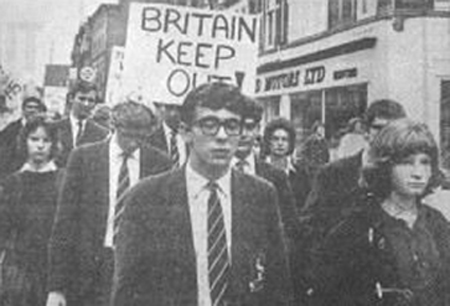The Sixth down pens over blockade
Daily Herald, Thursday, October 25, 1962
After prayers at Midhurst Grammar School, Sussex, yesterday the head boy led a deputation to the headmaster’s study. He said something which would have staggered – and probably delighted – Old Midhurstian H. G. Wells.
With proper respect and deadly seriousness, he reported that the Sixth Form had decided to go on a two-day no-lessons strike in protest against the United States’ action over Cuba.
And last night other schools in West Sussex and over the border in Hampshire were considering taking similar ‘down-pens’ action.
Midhurst Grammar School is co-educational and has 400 pupils.
This is how the strike went:
- About 32 boys and six girls from the Upper Sixth refused to attend any lessons. They carried out all their usual duties as prefects.
- They sent a petition to the Prime Minister protesting against the American blockade of Cuba and pleading with him to intervene in the cause of peace.
- They marched through the streets of Midhurst carrying slogans – banners, held aloft on hockey sticks.
- They stood in silence for 15 minutes around the local war memorial.
- They canvassed neighbouring schools in West Sussex and Hampshire for support.
‘I was flabbergasted when they came to me,’ said Norman Lucas, the headmaster. ‘I told them I did not agree with their decision. But I shall not take any disciplinary action. They are all very sincere – and here we teach them to think for themselves.’
The head boy, Robin Marriner – ‘a magnificent boy,’ said the Head – who will shortly sit for an entrance examination to Brasenose College Oxford, said: ‘We first thought of taking action when we heard the news on Tuesday. A few of us debated it well into the night. We then held a meeting after Assembly this morning. The strike was the result. Whether or not we shall continue after Wednesday depends on the international situation – and what Mr. Macmillan does.’
And what do their elders think of it? Robin’s father, Mr. Jesse Marriner, a farmer, told me: ‘I told my boy to go ahead if he thought what he was doing was right. I am fully in sympathy with their feelings but I do not think their protest will do much good.’
A member of the Board of Governors, local ironmonger Mr. Geoffrey Allin, said angrily: ‘The governors must hold a special meeting to consider the pupils’ action. The demonstration should never have taken place. It certainly would not have done when I was there.’
Eighteen boys in the upper sixth did not join the strike.
Girls in a blockade walk-out
Daily Mirror, Friday, October 26, 1962
Sixty grammar school girls yesterday staged a walk-out in protest against the blockade of Cuba. They marched out of the Glanmor girls’ grammar school at Swansea an hour before their lessons finished. They are expected to go back today.
The forty sixth-form boys on strike over Cuba at Midhurst Grammar School, Sussex, yesterday pooled their pocket money to collect £2. They used the money to send cables to Russia’s Mr. Krushchev and Mr. Kennedy, the American President. The cables said: ‘We demand negotiations before force. Youth wants to live.’
PROTEST ROUND-UP: Armed police guarded the US Embassy in Paris as 500 people chanted anti-Kennedy slogans. Pope John made a Vatican radio appeal for negotiation. Moscow students held a protest meeting and a demonstration.
Discipline upheld
The Sphere, December 8, 1962
Mr. Lucas, the Headmaster of Midhurst Grammar School, where the ‘Great Strike’ took place at the height of the Cuban crisis, has received backing from the School Governors and the West Sussex Education Committee, for the disciplinary action he took against the strikers. Both bodies thought it right to acknowledge their appreciation of the ‘sincerity’ of the strikers. The disciplinary measures taken do not appear to have been unduly severe. The children involved lost a day of their half-term holiday. The right of a headmaster to discipline his pupils has been therefore satisfactorily, if mildly, upheld.
I had no idea that this right (indeed, duty) of a headmaster was a matter for confirmation by higher authority. But so it clearly was. Which makes it easier to understand the haywire state of discipline in more adult fields of endeavour where strikes and subversion are the order of the day, as they have been at Dagenham.
Clearly, the right of the ‘head’ to discipline in proven cases of subversive actions is by no means accepted as a truism anywhere on earth today, but Mr. Lucas’s mild riposte was surely not victimisation. Should he have welcomed back the offenders with full honours and sixth-form privileges, while higher authorities deliberated at greater length and with more meticulous scrutiny of precedents whether any scintilla of right remains to a boss to enforce discipline under present day conditions?


